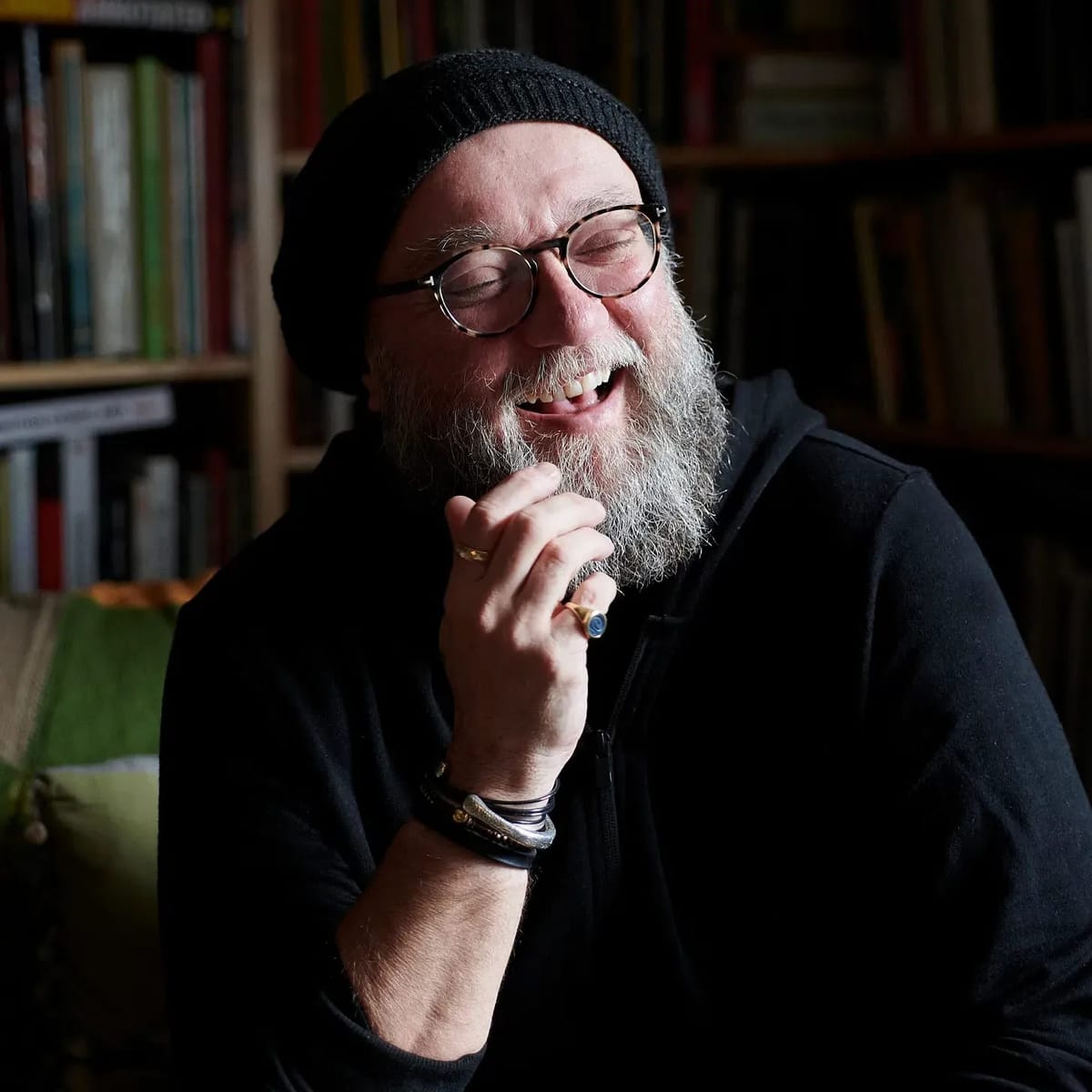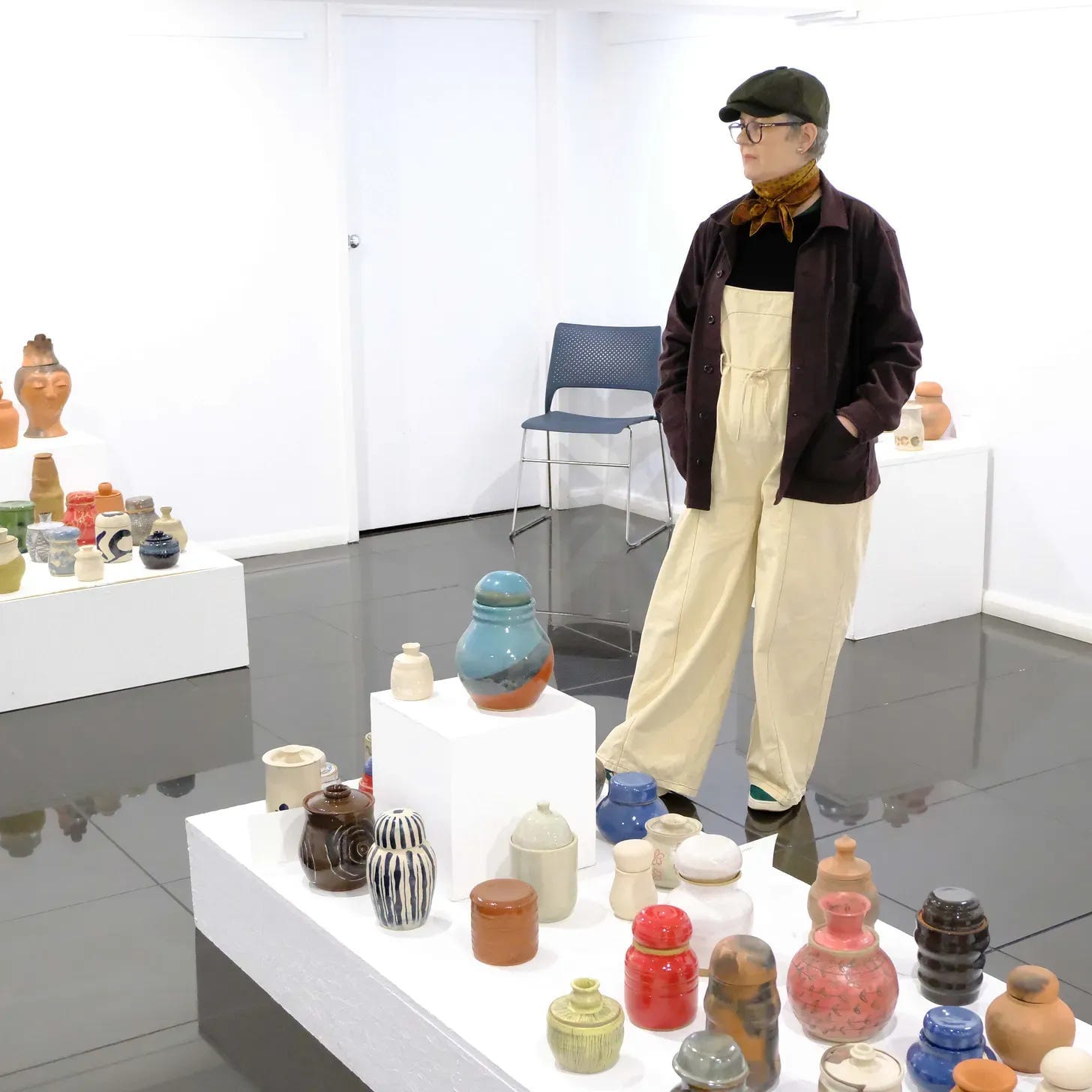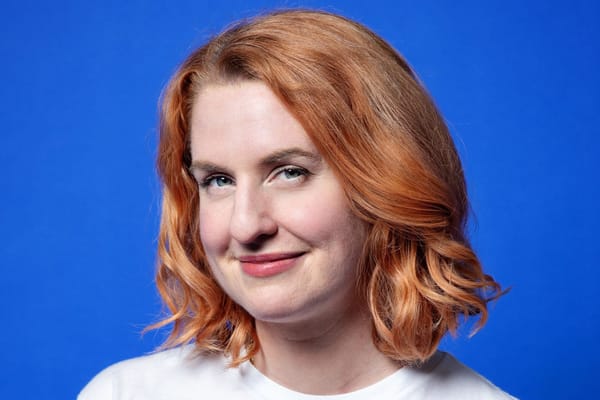“I have got very down and dirty on occasions and lost paragraphs”
What Steven asked maker Nik Vincent and and writer Dan Abnett in the second and final part of our interview

In the second of a two-part interview, Steven speaks to wife and husband Nik Vincent and Dan Abnett. Nik is a potter and writer and has worked with Dan on a number of books. They speak about what happened to Nik’s 144 pots, why Dan was thanked in the credits of Guardians of the Galaxy, AI scraping your work, and lots more.
When we spoke last year, Nik, you had your pottery exhibition at Nucleus. How did that go? What's happened to the pots since then?
Nik: It went brilliantly, and I wish I was a few weeks further down the line for answering this question because, at the momen,t I don't have any further plans. I had some very important people come and look at that exhibition. I had lovely comments in my visitors’ book, which I'm glad I put out, and I had a good turnout. The ideal is to get it in a gallery or museum, in each of the ten regions that I outlined for the project. I've just got to knuckle down and get myself out. It's the hard bit.
Where are the pots currently?
Nik: My pots are in boxes in my studio, ready to ship.
Dan: It’s a matter of finding the galleries to display it, and I can’t imagine a gallery not wanting to.
Nik: It may even potentially appear in Whitehall.

Dan, you mentioned your involvement in the Guardians of the Galaxy. If you sit through the full credits, you are thanked in the credits.
Dan: I am thanked.
Is that instead of being paid for your work?
Dan: Yes.
Nik: That’s the simple answer.
Dan: Working for Marvel…
Nik: You are working for hire.
Dan: You're acknowledged as the creator or co-creator of things, and you get royalties if they make toys, and you get royalties or you get reprint fees if it's reprinted. Marvel occasionally pays a gratuity to you, a quiet ‘thank you,’ which they pretend is something else.
Nik: You absolutely do not have to pay to go to the premiere, for example. I did have to buy my own dress, though.
Dan: Having come through the 80s and 90s, signing my work-for-hire vouchers every time, I know I don't own this. More particularly, some creators have pointed out that the work-for-hire agreement that has been in existence since the 70s with the big American companies never imagined a world where we would have things like the Marvel movies, never imagined streaming, didn't imagine computer games... Those vast earnings. I think when I started writing comics, it didn't feel like it was signing that away because that didn't exist, nor could it exist. My name has been in the thank you end credits of, I think, seven Marvel movies and several of the TV shows.
Nik: That you know about.
Dan: I am grateful for the fact that they least acknowledged my presence really.
Have you ever been invited to a writer’s room?
Dan: Not for the TV, no. There is a weird separation. I don't know if it's going to change now because the steam is slightly coming out of the superhero movie thing. One of the things they did very early on was they decisively said, ‘We are not going to employ the comic creators to work on the movies because we want specialist movie or TV people to write them and the design work and the artists.’ A few people managed to pass through that barrier, but it was deliberately if you wrote the comic, you can't possibly write the film. That's not your job. You did that thing.
Nik: You were on set with James Gunn.
Dan: I got invited to the set and the premieres and that was all very nice.
Nik: Has the contract changed?
Dan: I don't believe it has.
Nik: You're signing the same contracts?
Dan: Well yeah, because they're all virtual now anyway.
Nik: Maybe you should look at them.
Dan: There's a lot of the newer comic companies I would cite, for instance, Boom, who I've done a lot of work for, and Dark Horse and people like that, who are now very consciously, as it were, sharing ownership with the creators. If you come to us, we will publish your book, you will create it for us. And then if it gets turned into a movie, and a lot of them are, it's set up right from day one that you will be acknowledged as creative, you will get a share of the profits and that kind of stuff like that. I think that's a very fair way of doing it.
Nik: There's a lot more creator-driven stuff through that that does not apply to the big two.
Dan: Yeah, the big two are only really interested in people perpetuating the legacy characters. That creator ownership is useful, and the idea of, ‘If I let company X publish my creator-owned comic, they'll get half of whatever it earns when it gets turned into a movie.’ I'm going, ‘How else are you going to get published?’ Publishing that comic, they've put in the financial investment to publish it. Of course they deserve some remuneration for that effort because otherwise, the world wouldn't know about it, and it wouldn't be a comic to be adapted in the first place. That happens more and more, which is quite nice.
Nik: And we like gatekeepers. We kept being asked, “Why don't you self-publish?” Because we like editors and all the people that go together to make a thing. If I had to publish my own book, I don't know anything about type, I don't know anything about font, I don't know anything about cover art.
Dan: I think this is actually much more relevant now than it was even five or certainly ten years ago, is that with the advent of generative AI, we're getting to the point where… I’m not talking about it writing books, I'm talking about the idea of publishing and editing happening by processes that we're not aware of. I'm not saying I despise all AI and modern technologies, that's not where I'm going with this. It's just that I think we are increasingly undervaluing the importance of all sorts of skills.
Nik: Human intent.
Dan: In comics, the skill involved in the colouring, for instance, and particularly the lettering, which also gets overlooked, even though it's now mostly digital work applied by an artist who knows what they're doing. The idea is that you get to the point where this can be done automatically, and it simply will not look the same, no matter how finessed it is, and that is what we're talking about then encroaching into the realms of writers, of artists, of set designers, costume designers, and they are skill sets that if we lose them for say a generation…
Nik: How do you go back?
Dan: You'll have to relearn how to do all those things. I think that's a really important thing to be aware of.
Nik: There's no art without intent.

Search tools have been created to see if your work has been scaped for AI. Have you looked into it?
Dan: Oh yes.
Nik: You got dragged into it because there's a woman SF writer who bangs the drum for genre writers really hard, and I think she was the first one.
Dan: I've seen it a lot. Everybody has. It happens no matter what the safeguards are, no matter what the legislation in this country is to prevent it happening without permission that is being ignored completely. We were having a hard enough time chasing down piracy of digital books let alone the idea that they're being scraped for AI. There are several authors now really leading the charge with it, which I think is admirable. Most authors aren't even aware that it's happening. It is that stripping down of this raw material. The argument being offered is that the AI won't work unless they are trained. You need huge datasets to train them. This is the inevitable consequence. I think not only is that unethical, if it's too expensive to do it, maybe you can't do it. That's a reasonable point.
Nik: That's the argument. They're saying, ‘We need these massive datasets,’ and then, ‘We can't afford to buy them.’ And you're going, “Oh, fuck off then.”
Dan: They've got to the point now where they realise they haven't got data that's big enough. They are essentially manufacturing artificial data sets to train their things. One of the big things about AI, if you know anything about it at all, on a very basic theoretical level, is that one of the fears of AI is that we don't understand what it's doing. Once it is created, we don't understand what it's doing inside that black box, how it's arriving at the processes, that we don't understand the things guiding it. One of the touchstones all the way through has been to make sure, algorithmically speaking, it is basically set up to be a benign and creative thing and that this thing couldn't possibly be polluted. We're already discovering as we're galloping towards the AI frontiers that we are deliberately polluting the AIs by pouring anything we like into them. What's in the black box is not this brilliant ethical balanced… It is something that is absolutely as temperamental and as biased as the human product that has been fed into it. Some of that human product is the equivalent of silage because it's been artificially produced to bulk this matter up. They've also recently discovered that even basic coding languages, of which there are many, and they're always seen as interchangeable, some are better for one purpose, and some are better for others. There are several good books on this…
Nik: They're actually talking a third language basically.
Dan: Those coding languages, it doesn't sound as if it should be possible, but they have political bias in them. We didn't realise this, and we've been using this for years. In other words, even the code that we would have been writing those Asimov laws of robotics to code out AIs was biased to begin with is inevitably biased.
Nik: Anything that's a by-product of white men is biased.
Dan: Let's not get into it because this isn't the place, but the whole AI debate is really interesting because we're long past the point at which we've already demonstrated that it is in so many ways a bad idea.
Nik: It would be bad enough if it was only amoral, but it is immoral, and there's no intent attached to it.




